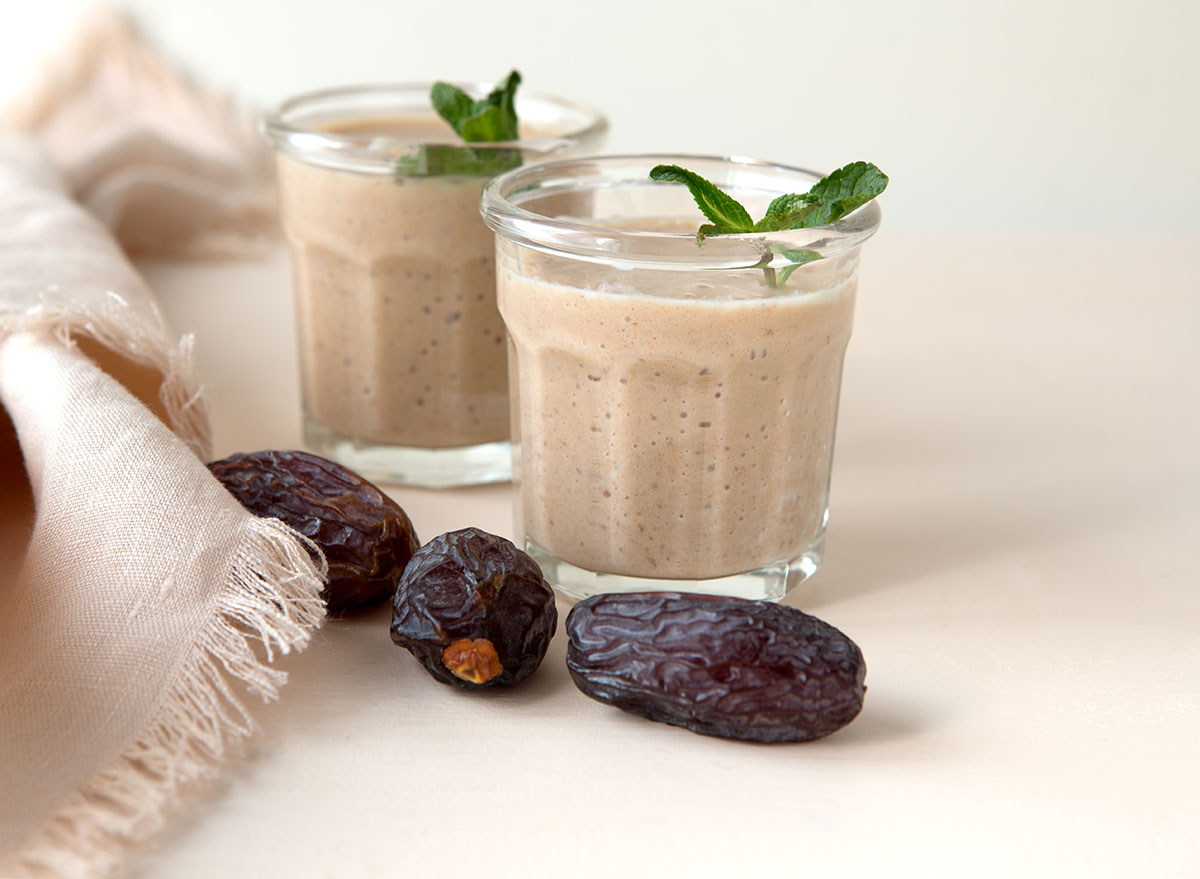Are Dates Good for You? Here's What a Dietitian Says

Dates are a naturally dehydrated fruit, and their popularity among the masses can be traced back over thousands of years. While Medjool dates are the most popular variety, other varieties of dates you may find in specialty food markets include Dayri, Halawy, Thoory, and Zahidi. This delicious fruit is healthy and can be part of your healthy eating plan. At the same time, the sugar and carb content of dates still has caused many to wonder, are dates good for you?
As I grew up in Israel, dates are a regular part of my daily diet. I toss them in smoothies, sprinkle tossed dates on my morning bowl of oatmeal, and stuff them with almonds as a quick and easy snack. The answer to whether or not dates are good for you and if the potential impact of the side effects outweighs their nutritional potential benefit really hinges on the amount you consume daily. So, the best way to reap the benefits of eating dates is to consume them in healthy moderation.
To help you determine whether or not dates are good for you based on your own unique nutritional needs, read on to learn some of the side effects and benefits of eating dates, including what might happen to your body if you eat too many. Also, for more healthy eating advice to help you stock up on the best fruits for your health, don't miss 10 Healthiest Fruits To Eat Every Day.
Dates can help fight inflammation.

Many studies have shown that dates have anti-inflammatory activities. Not only can you find these anti-inflammatory activities in the whole fruit, but you can also reap the good-for-you benefits by consuming other products deriving from dates, like date syrup and date paste.
They help with immune function.

Selenium, a mineral found in this fruit, is needed to help with immune function. The recommended daily amount of selenium for ages 19 years and up is 55 micrograms for both men and women. One cup of chopped dates provides 4.41 micrograms of selenium—or 8% of the recommended daily value. Even if you eat one or two dates daily, you'll get another source of food that contributes to this important mineral.
They help promote positive labor and delivery outcomes.

A 2020 systematic review looked at the effects of date fruit on labor outcomes compared with routine care. The data showed that eating dates can significantly reduce the active phase of labor. Duration of the other phases of labor and frequency of cesarean section had no effect. Researchers concluded that there may be a link, but more research is needed. If you are pregnant and want to add a few dates a day to your healthy eating plan—then go for it!
They may help reduce your risk for heart disease.

Dates provide soluble fiber, which can lower LDL ("bad") cholesterol. Soluble fiber binds with the LDL cholesterol which prevents it from being absorbed into your blood. In turn, this helps prevent cholesterol's fatty deposits from building up on your artery walls (known as atherosclerosis) and helps reduce your risk for heart disease.
They have been linked to slower cancer risk.

Dates also contain powerful antioxidants, including carotenoids, polyphenols, and anthocyanins. Eating a diet high in antioxidants has been associated with a reduced risk for chronic diseases such as cancer. In addition, a 2014 published study found that dates may help decrease the risk of colorectal cancer.
They may help lower your risk of diabetes.
Soluble fiber has many benefits, including helping to control blood sugar levels. In addition, the phytonutrients found in dates may play a role in helping control and even improve the disease. According to a 2014 published paper on the therapeutic effects of date fruits, various components found in this pitted fruit, including flavonoids, phenols, and saponines may play a role in controlling diabetes though the exact mechanism of action is not fully understood. A 2013 study on flavonoid compounds from dates showed improvements in diabetic rats.
Dates can help close nutrient gaps.

According to the 2020–2025 Dietary Guidelines for Americans, there are four nutrients that Americans across all ages and life cycles under consume. These four nutrients include fiber, potassium, calcium, and vitamin D. Four dates (about 100 grams) provides 27% of the daily recommended amount of fiber and 20% of the daily recommended amount of potassium. Eating a few too many of this fruit provides an excellent source of the two under-consumed nutrients, which helps close this nutrient gap.
RELATED: Are Potatoes Good for You? 9 Effects of Eating Them
They can help fight bacteria.

Dates and the elements that are present within the fruit have been shown to help control infection. One 2012 study showed that extract from the leaves and pits inhibits the growth of several types of microorganisms. Another 2010 study found that the extract from the pits helps inhibit the growth of Gram-positive and Gram-negative bacteria. As folks don't eat the leaves and pits of dates, more research is certainly needed.
You may put on a few pounds.

Is it possible to eat too much of a good thing? In the case of this naturally dehydrated fruit, possibly. Four dates (about 100 grams) provide a whopping 277 calories. If you're going to pop those sweet babies in throughout the day, you can surely go over your daily calorie limit. This can ultimately lead to weight gain. However, do keep in mind that how much weight you can gain really hinges on how many dates you're munching on at a time. So, to avoid this, be mindful of your portions when consuming dates, and maintain moderation.
- Source: https://fdc.nal.usda.gov/fdc-app.html#/food-details/168191/nutrients
- Source: https://pubmed.ncbi.nlm.nih.gov/23553505/#:~:text=The%20main%20chemical%20components%20of,environment%2C%20postharvest%20conditions%2C%20etc.
- Source: https://pubmed.ncbi.nlm.nih.gov/12850886/
- Source: https://www.ncbi.nlm.nih.gov/pmc/articles/PMC7157989/
- Source: https://www.ncbi.nlm.nih.gov/pmc/articles/PMC4473134/
- Source: https://pubmed.ncbi.nlm.nih.gov/22761049/
- Source: https://www.dietaryguidelines.gov/sites/default/files/2021-03/Dietary_Guidelines_for_Americans-2020-2025.pdf
- Source: https://www.dietaryguidelines.gov/resources/2020-2025-dietary-guidelines-online-materials/food-sources-select-nutrients#:~:text=Calcium%2C%20potassium%2C%20dietary%20fiber%2C,for%20the%20general%20U.S.%20population.
- Source: https://academicjournals.org/journal/JMPR/article-abstract/8C79E5325796
- Source: https://pubmed.ncbi.nlm.nih.gov/18955267/









